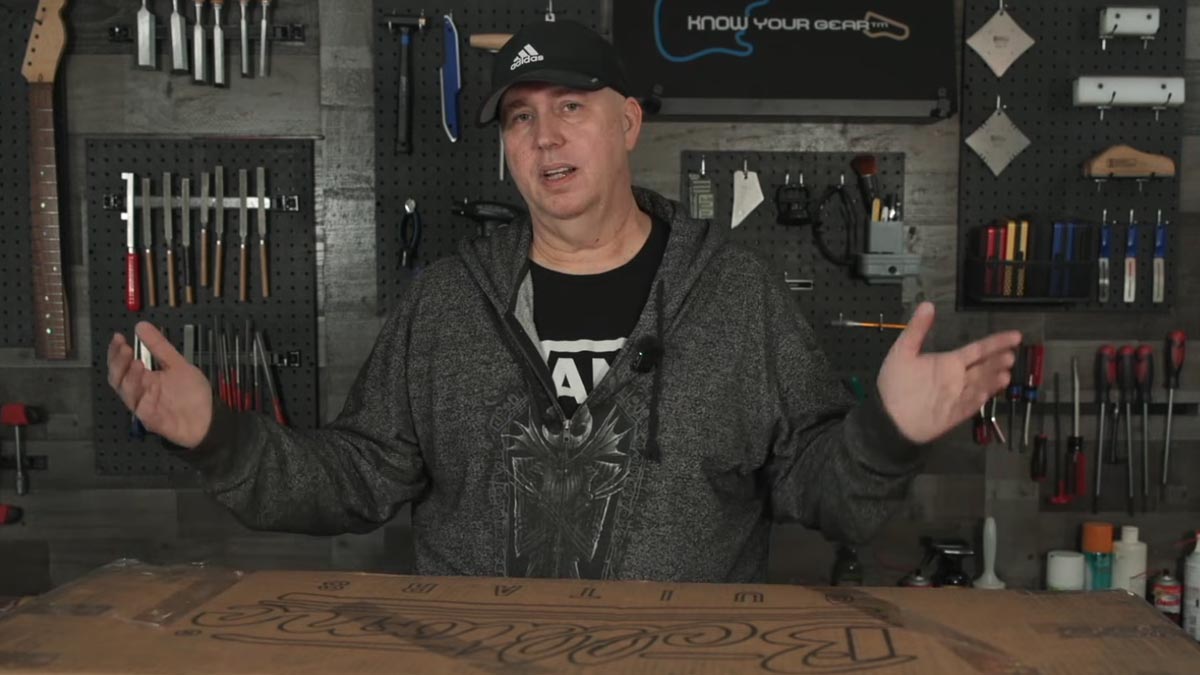Devin Townsend: “When you ask people about their favorite amp, the acceptable responses are always the cork-sniffin’ ones. If it’s an Axe-Fx, people go, ‘That’s sacrilege!’”
The Canadian prog-metal virtuoso discusses why he prefers digital amps to analog, the uncomfortable proportions of a Les Paul, and the magic of open C tuning

Devin Townsend has come a long way since he emptied his bowels inside Steve Vai’s guitar case. Back then, in the early ’90s, Devin was barely out of his teens and had just scored his big break singing on Vai’s album Sex and Religion. But as a guitar player himself, he felt overawed in the presence of the virtuoso – and expressed his feelings in the worst way imaginable.
What’s amazing is that he and Vai have remained good friends in all the years since then. And as Devin says now, that ghastly prank was really a backhanded compliment. “I was fortunate enough to work with Steve early on and realised he was so much better than me,” he admits. “And if one can’t articulate your discontent in an elegant way, then your options are mainly just shitting on things, I think!”
Toilet humour aside, Devin has much to talk about right now as he hooks up with Total Guitar via Zoom, seated in a neon-lit home studio that looks more like the control room you’d find on a spaceship. In his new album Lightwork, the Canadian prog metal mastermind delivers another thrillingly eclectic collection of songs that force the listener to engage as a direct consequence of their left-field creative detours.
You’re never quite sure where this rollercoaster of noise will take you. And this, Devin says, can be attributed to doing the most obvious thing any musician can - something we’re all guilty of forgetting after many years of practice...
“This is going to sound as pretentious as it feels to say, but often when I’m playing I have to remind myself to listen to what I’m playing,” he explains. “That sounds absurd, right?! Because of course you can hear yourself. But there’s a slight but significant distinction between hearing and listening. Hearing it, at least in my case, means you end up focusing on technique.
“When I’m listening, however, I’m thinking about what note should come next rather than muscle memory automatically going to the shapes I always go to. I might realise I don’t need that other note. I get less hung up on being perfect, because ultimately I’m not perfect, so why be so concerned about that?
“Oftentimes, the best ideas come when I slow down my thoughts enough to be with the patterns I’m playing. That’s when I start participating in sound instead of going through the motions that result in sound.”
All the latest guitar news, interviews, lessons, reviews, deals and more, direct to your inbox!
On the subject of his tools to create those sounds, he explains he’s fortunate enough to work with several companies who help bring his otherworldly ideas to life. His main instrument, the Stormbender by German company Framus, takes inspiration from the flagship Gibson Les Paul Custom, though with a few tweaks and customisations to assist with Devin’s modern metallic assault.
“I still occasionally bring out my white Les Paul Custom,” he says, revealing it was bought for him by a group of friends for his 40th birthday. “But the problem with Les Pauls is they look shit on me! On some people they look fantastic. When you see Joe Perry or Slash holding a Les Paul you think, ‘Damn, that’s a match made in heaven!’ I already look like a dork so if you add a guitar that’s too small for my stature, it looks awful!”
The problem with Les Pauls is they look s**t on me! On some people they look fantastic
He continues: “The Framus design was about replicating that sound but with a shape closer to something I could get behind. One major difference is the scale length. My Framus is 25” because I mainly play in open tuning with 10-52 gauge strings. The Gibson scale length would feel a little shaky tuned down like that. The pickups are my signature set that I designed with Larry Fishman some years ago, which have a bit more chewiness and less compression compared to the regular Fluence Moderns.”
Then there’s his Empath acoustic, made by Vancouver-based company Prestige, which also feature Fishman pickups, built with a spruce top and mahogany sides. There’s a lot of music in them, Devin says, which as he rightly points out is the true test of any guitar.
More recently, he’s partnered up with Kiesel for a headless instrument that is used exclusively for ambient tones. The other guitar heard on the new record is a Sadowski Telecaster, sporting a DiMarzio humbucker and a Seymour Duncan singlecoil in the bridge.
Though the electrics were initially fed through old Mesas and Marshalls at the insistence of Lightwork co-producer Garth Richardson, Devin ended up reverting back to his favourite amp – after all, it was the one he knew would always get the job done. And before he elaborates any further, he points out he’s aware it’s a controversial choice...
“It’s funny, when you ask people about their favourite amp, the acceptable responses are always the cork-sniffin’ ones like the Dumble or some Super Overdrive that’s been hidden away since 1956,” he laughs. “And you’re allowed to say that, because that’s sexy. But if you go around telling people it’s an Axe-Fx, people go ‘That’s sacrilege!’
“My whole workflow includes tailoring sounds to suit the music I write. When I’m done, the sounds I’ve created are perfect for that song. When producers ask me to re-do it through some hissy old amplifier, I’ll go down that rabbit hole but I always come back to digital because it’s clean and I can control it. What people find problematic with the Axe-Fx is that it gives you all the options to make something fantastic or monumentally shit. It’s up to the user.”

It doesn’t take long to work out that going against the grain, ignoring trends and forging his own path has been key to Devin Townsend’s success.
Mixing elements of progressive rock, heavy metal and classical music into his own bombastic concoctions has allowed him to exist independently as a songwriter, in a place he describes as a carte blanche for his mind. Even the way he tunes the majority of his guitars says a lot about his creative process – he knows what works and simply has no desire to deviate.
The great thing about open C tuning is that all the strings function in the same way
“I haven’t been in standard tuning since the beginning, pretty much,” he grins. “I’m usually in open C, which harkens back to my love of Led Zeppelin III. From the lowest string to the highest, the strings are tuned CGCGCE. It’s basically a C major chord, though sometimes I might change the key and tune to B, or whatever. My whole style has been largely informed by that.
“The great thing about this tuning is that all the strings function in the same way. Say if I want to play a major line or arpeggio, I’d play the 5th, 7th and 9th frets. If I want minor, it would be 5th, 7th, 8th. There’s a cool droney thing about playing in open. You can use a lot of pedal tones and when you combine that with the amount of echo I use, it can get really hypnotic. Basically, it makes things sound way more complex than they actually are!”
- Lightwork is out now via Inside Out Music.
Amit has been writing for titles like Total Guitar, MusicRadar and Guitar World for over a decade and counts Richie Kotzen, Guthrie Govan and Jeff Beck among his primary influences as a guitar player. He's worked for magazines like Kerrang!, Metal Hammer, Classic Rock, Prog, Record Collector, Planet Rock, Rhythm and Bass Player, as well as newspapers like Metro and The Independent, interviewing everyone from Ozzy Osbourne and Lemmy to Slash and Jimmy Page, and once even traded solos with a member of Slayer on a track released internationally. As a session guitarist, he's played alongside members of Judas Priest and Uriah Heep in London ensemble Metalworks, as well as handled lead guitars for legends like Glen Matlock (Sex Pistols, The Faces) and Stu Hamm (Steve Vai, Joe Satriani, G3).




